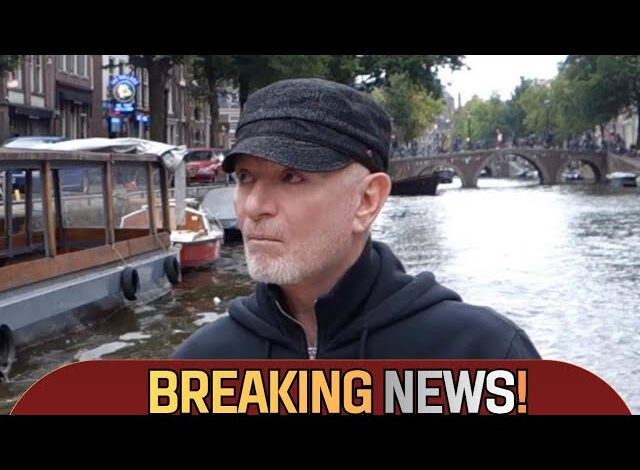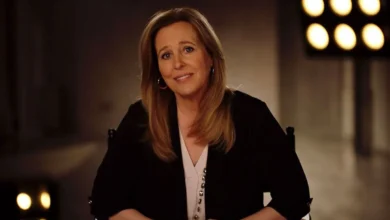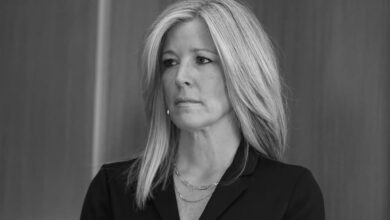Anthony Geary’s Final Curtain Call — A Life Beyond the Spotlight!

Anthony Geary: The Rogue Who Changed Daytime Forever — And the Man He Became After Luke Spencer
They called him Luke Spencer — the charming rogue, the reluctant hero, the man who transformed a daytime soap into a national obsession. But behind the iconic character was Anthony Geary, a thoughtful, private artist who helped define an entire era of television and then walked away from fame to find a peace he had never known.
This is the story of the man who captivated millions, stepped off the most-watched stage in daytime history, and ultimately found himself far from Hollywood.

A Role Never Meant to Last
It’s almost impossible to imagine now, but when Anthony Geary first appeared on General Hospital in 1978, his character wasn’t destined for legacy status. Luke Spencer was created as a temporary role — a streetwise, morally gray fixer brought in to do the dirty work of Port Charles’ underworld.
But something unexpected happened.. Audiences didn’t just notice Luke Spencer. They connected to him. They rooted for him. They loved him. Geary brought a new kind of energy to daytime television: unpredictable, dangerous, wounded, witty, and deeply human. He wasn’t a polished romantic lead. He was flawed — and that made him compelling.
The Partnership That Made History
Then came Laura Weber, played by Genie Francis.
Together, Luke and Laura became the heartbeat of General Hospital. Their chemistry wasn’t just good — it was explosive. They were fire and vulnerability, rebellion and romance, chaos and destiny rolled into one.
And in 1981, their wedding changed television forever.
More than 30 million viewers tuned in — the largest audience ever recorded for a daytime drama. Even Hollywood royalty Elizabeth Taylor appeared in a cameo.
It wasn’t just a wedding. It was an event. A cultural moment. Proof that soaps could be mainstream, powerful, and unforgettable.
And at the center of it all stood Anthony Geary, the unlikely superstar.
The Weight of Fame
But superstardom came with a price.
As the 1980s went on, Geary grew increasingly uncomfortable with being defined by one character. He respected Luke Spencer — even loved him — but he was an artist who wanted range, reinvention, and creative freedom.
“It’s a wonderful thing to be loved by fans,” he once said. “But it’s hard to be trapped in one character for a lifetime.”
So he walked away.
Geary left General Hospital in the late 1980s, determined to explore new roles and new challenges. But daytime fans weren’t ready to let go.
And neither, perhaps, was he.
A Homecoming — And a Reinvention
In 1993, Anthony Geary returned to General Hospital, not as the wild, young antihero fans remembered, but as a more complex man shaped by time.
What followed was a rare and remarkable thing: an actor reinventing his own legacy.
Luke Spencer became deeper, darker, more introspective. He was no longer the rebellious young man; he was someone burdened by memory, haunted by loss, yet still fighting for redemption.
Writers embraced the evolution, and Geary delivered some of the most brilliant performances daytime television had ever seen.
He went on to win eight Daytime Emmy Awards — a record for a male actor in daytime drama.
Not because Luke was perfect. Because he was real.
The Quiet Goodbye
By 2015, after nearly four decades of living as Luke Spencer, Geary knew it was time to close the final chapter.
His exit wasn’t explosive or sensational. It was reflective, gentle, and deeply human — much like Geary himself.
Luke left Port Charles with a hint of mystery, wandering into the horizon with the restless spirit that defined him from the start.
Geary later admitted that leaving was painful — but necessary. He wanted to reclaim his identity, not as a legend or a symbol, but simply as a man named Tony.
Life After Port Charles
After retirement, Anthony Geary settled in Amsterdam, embracing a quieter, slower life.
There, he found what fame had never given him: anonymity.
He paints. He travels. He spends time with loved ones. He rarely gives interviews, choosing a life of privacy and peace over the spotlight he once commanded.
“In Amsterdam, I’m not Luke Spencer,” he said. “I’m just Tony. And that’s exactly who I want to be.”
A Legacy That Will Never Fade
Yet his impact remains everywhere.
Any time a soap introduces a morally gray hero…
Any time a love story fuses romance with raw imperfection…
Any time an actor dares to play vulnerability instead of charm…
You can trace those choices back to what Geary brought to General Hospital.
Luke and Laura aren’t just soap characters. They’re part of American pop culture. And Geary, with his artistry and his courage, helped elevate the genre into something richer, braver, and more meaningful.
Honoring the Journey
In recent years, Geary has stepped into the public eye only to honor friends and collaborators from his General Hospital days.
When longtime co-star Tristan Rogers passed away, Geary spoke with quiet heartbreak, calling him “a giving actor and a joy to share the stage with.”
Moments like these remind fans that behind the legendary scenes were real relationships and decades of shared storytelling.
And even now, many viewers continue to hope that one day Luke Spencer might return — alive somewhere in the fictional universe, still searching for his next adventure.
Because Luke Spencer, like the man who played him, was never just about endings. He was about resilience. Reinvention. Second chances.
The Artist and the Man
Anthony Geary’s story isn’t merely the tale of a soap icon. It’s about transformation — of a character, of a genre, and of a man determined to define himself on his own terms.
He gave the world a hero who wasn’t always heroic, a lover who wasn’t always perfect, and a man who never stopped searching for meaning.
And perhaps that’s the secret to Luke Spencer’s lasting power:
In him, we see ourselves — our flaws, our hope, our longing for love, and our belief in second acts.
From Port Charles to Amsterdam, from daytime legend to quiet artist, Anthony Geary reminds us of one beautiful truth:
Sometimes the greatest role you can play…
is your own.




